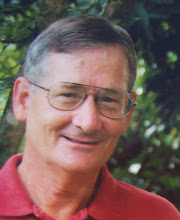Twan efoʼ, yé ó bʼa lɛʼle twan epihe cyen.
ant first it Foc Past show ant last walk
It was the first ant who taught the last ant how to walk.
The point is that the Badwe'e of today are safe and secure when they let their elders pass on wisdom from the past. The first ancestor, Edwe'e, is now long dead, but they believe they are learning his way of walking from all those who have been faithful to the ways of the past. As a result, they are always looking to see if a proverb from the past can be invoked to make it clear that the present change is needed and is somehow faithful to the traditions of the fathers. [OZM0029] There is no better way to motivate a Badwe'e than to say "Your tombs and mine!" Thinking about those who are gone makes one feel every powerful emotion and know one is fully alive and capable of undertaking the most arduous tasks. Joseph Azabor, shown at the right, called on SIL to begin working in his village in 1985. Once he even called on his SIL houseguest and coworker to contemplate their ancestors' tombs! These SIL researchers worked with the Badwe'e people to design an orthography and to take control of their future in a manner they themselves manage and direct. They know that it is no longer enough for them to speak their language; they must be able to read it and write it, too. They see that the there is no other way for the word to get out to the whole people-group apart from written communication. The Badwe'e have been forced by changes imposed on them to change many things about their ways. Their ancestors were forced to go 40 miles to the east in the 1920's to seek treatment for sleeping sickness, and now those communities have grown large with new generations of Badwe'e. These Badwe'e are linked to their clans to the west and have heard about their progress in becoming literate. Now they have called on their relatives in the west to bring them the new possibilities of expressing themselves through writing. They are now the students of Elanga Ferdinand, shown at the right, who is playing his part in training teachers for this eastern region, helping them to learn and use a new, simpler orthography. In addition, he has helped them to imagine, create and manage their own committees to oversee the ongoing development of their language community. Thanks to your support, this eastward extension of the Badwe'e literacy program will take place. They will become literate and more ready to correct the problems of their community, including unemployment, AIDS, hunger, and the competing demands of raising a family and protecting the fauna of their forest.



No comments:
Post a Comment